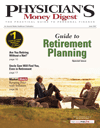Publication
Article
Physician's Money Digest
Uncle Sam Will Find You, Even in Retirement
Author(s):
Income and capital gains taxes couldtake 25% or more of your retirementincome if you're not careful. You willhave to pay income taxes on any withdrawalsyou make from IRAs and401(k) plans, and you will probablyhave to take out more money to coverstate taxes and possible income taxes onthe Social Security payments you receive.When it comes to capital gains,you'll owe 15% on long-term gains fromtaxable accounts. While it is impossibleto avoid taxes altogether, there are severalthings you can do to reduce theimpact they may have on your savings.
•Maximize contributions to yourRoth IRA. Your withdrawals of bothyour contributions and earnings will betax-free after age 59 1/2, provided you'veheld the Roth for at least 5 years. Youcan contribute $4000 a year to a Rothfor 2007, or an additional $1000 catchupcontribution if you're 50 or older.Because you pay taxes on the contributionsto your Roth when you put theminto the account, you will avoid payingthem upon withdrawal.
•Consider a traditional IRA. Ifyour adjusted gross income is too highfor a Roth (exceeding $166,000 forcouples filing jointly), you may want toput as much as you can into a traditionalIRA. While this kind of IRA may notbe tax deductible if you are in a high incomebracket, it is still an importantinvestment to consider. Starting in 2010there will be a change in the tax lawthat will let you convert your regularIRA to a Roth. But, it is important tonote that any amount attributable todeductible contributions or growth isgoing to be taxed as ordinary incomeupon conversion to a Roth.
•Use taxable assets first. Whenyou begin to dip into your nest egg, useyour assets in taxable accounts first,allowing your tax-deferred assets theopportunity to grow as long as possible.And you can avoid an ordinary incometax rate of as much as 35% on distributionsfrom these accounts. By withdrawingyour taxable assets you will only betaxed the 15% capital gains rate. But,please note, this 15% rate is only temporary.Starting on January 1, 2011, thecapital gains rate will rise to 20%.
•Gift some of your assets. If youalready know that you would like togift some of your assets, gifting canresult in both income and estate taxsavings. As you reduce your assets, youalso remove the earnings generated bythose assets from your taxable income.Additionally, with those assets removedfrom your estate ahead of time, yourheirs will receive the benefit of thosegifts and possibly avoid costly estatetaxes. Keep in mind, you can gift up to$12,000 in a year to any one of yourheirs without incurring a tax penalty.
Joseph F. Lagowski is vice president, investments,and a financial consultant with AGEdwards in Hillsborough, New Jersey. He welcomesquestions or comments at 800-288-0901, or visit www.agedwards.com. This articlewas provided by AG Edwards & Sons, Inc, member SIPC.
